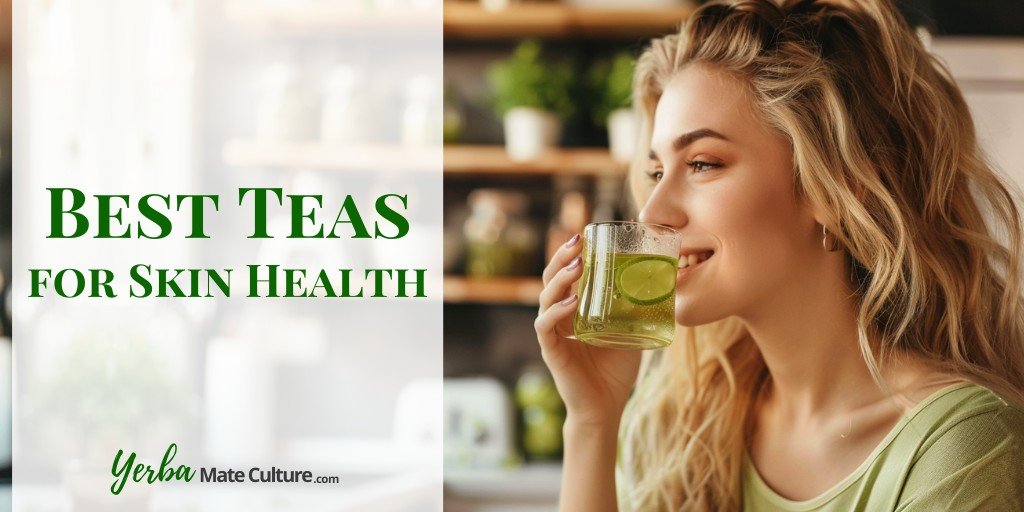Our skin is constantly exposed to environmental stressors such as pollution and UV rays, which can lead to premature aging and skin damage. Luckily, tea, my favorite beverage, boasts significant benefits for skin health!
Recent scientific studies reveal how various types of tea are packed with antioxidants, polyphenols, and other bioactive compounds that can enhance skin appearance, fight signs of aging, and even protect against environmental damage.
In this guide, I’ll introduce the best teas for your skin, complete with DIY recipes and insightful tips to integrate them into your daily beauty regimen!
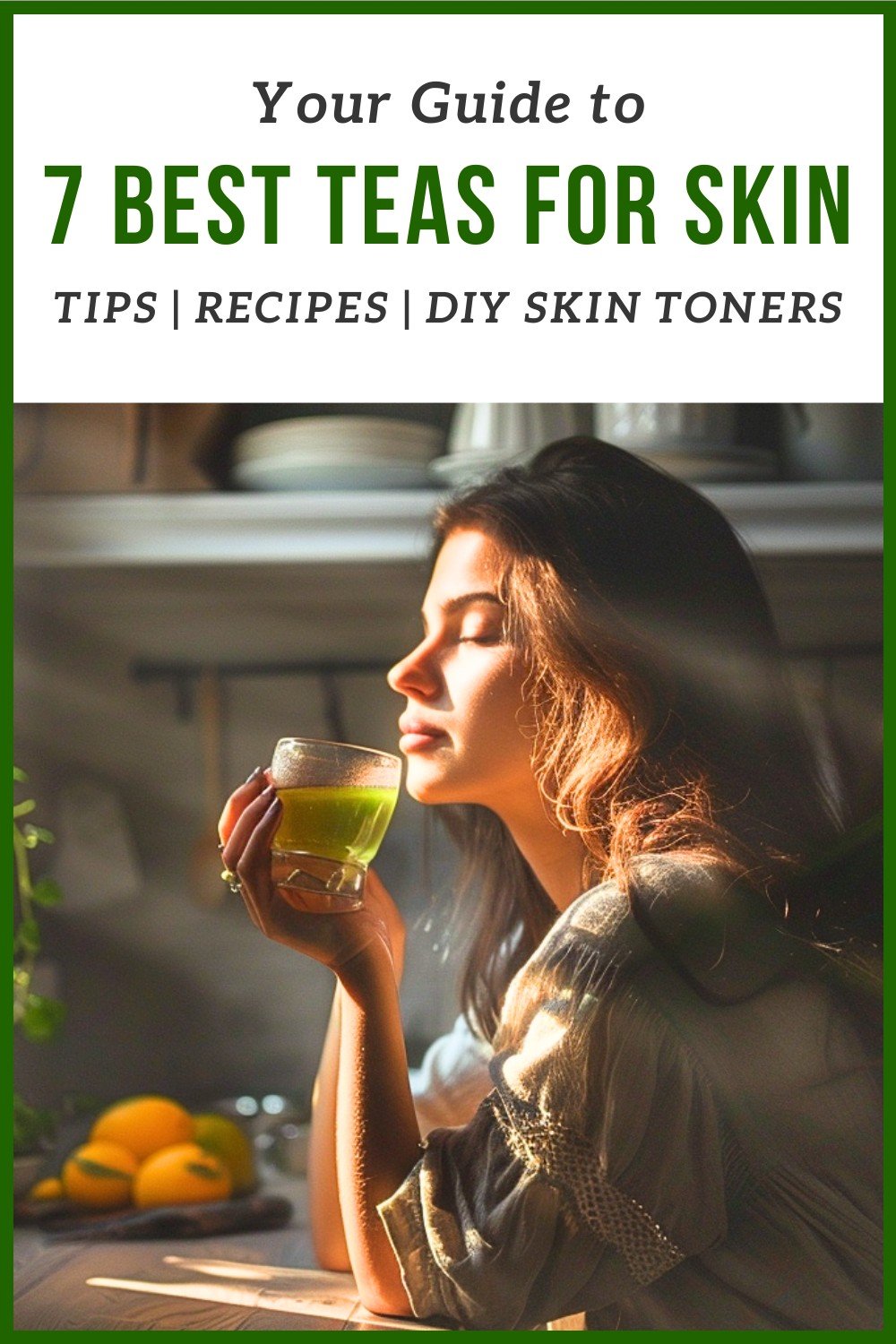
1. Green Tea: The Antioxidant Powerhouse
Green tea is renowned for its refreshing flavor and significant health benefits, especially its remarkable effects on skin health. Packed with potent antioxidants known as catechins, particularly epigallocatechin gallate (EGCG), green tea offers comprehensive benefits for protecting and enhancing skin quality.
Skin Benefits of Green Tea’s High Antioxidant Content
- Protection Against UV Damage: One of the most notable benefits of green tea is its ability to mitigate the effects of UV radiation. Studies, including one published in 2016, indicate that EGCG can reduce skin redness and prevent long-term UV damage when applied topically. This effect is crucial for preventing photoaging and skin cancer.
- Anti-Aging Properties: The antioxidants in green tea are powerful allies against the signs of aging. A 2019 study suggests that these antioxidants, particularly when consumed regularly, can significantly improve skin structure by reducing wrinkles and increasing elasticity.
- Enhanced Skin Hydration and Complexion: Drinking green tea has been linked to improved skin hydration and elasticity. A 2022 study demonstrated that participants who consumed green tea regularly showed enhanced skin hydration and overall skin health.
Drinking Green Tea for Skin Health

- Daily Consumption: Integrating green tea into your daily routine can boost your intake of antioxidants, which are vital for skin protection and rejuvenation. Aim for 2-3 cups of high-quality green tea per day to maximize the internal health benefits that contribute to a glowing complexion.
- Cold Brews: For those who prefer a less bitter taste, cold brewing green tea can reduce the caffeine content and enhance the antioxidant levels, making it a refreshing and skin-friendly beverage option.
DIY Green Tea Recipes for Topical Application
- Green Tea Facial Toner:
- Ingredients: 1 cup of brewed green tea (cooled), 1 teaspoon of honey, a few drops of essential oil (optional for fragrance).
- Preparation: Mix all the ingredients and transfer into a clean spray bottle.
- Application: Spray onto the face after cleansing or apply with a cotton ball. This toner helps to refine pores, soothe irritation, and impart an antioxidant boost to the skin.
- Green Tea and Honey Face Mask:
- Ingredients: 2 tablespoons of matcha green tea powder, 1 tablespoon of honey, 1 teaspoon of baking soda.
- Preparation: Combine ingredients to create a paste.
- Application: Apply the mask to your face and leave on for 10-15 minutes before rinsing with warm water. This mask is excellent for exfoliating, moisturizing, and improving overall skin brightness.
Utilizing green tea, both through dietary consumption and topical application, harnesses its antioxidant power to protect and beautify the skin.
Whether you’re sipping it throughout the day or incorporating it into your skincare routine, green tea offers a natural, effective way to support healthy, youthful skin!
2. White Tea: The Anti-Aging Secret
White tea is often regarded as one of the most delicate tea varieties as it’s harvested at a young age and minimally processed. This minimal processing helps preserve high levels of antioxidants, which are especially beneficial for anti-aging and skin rejuvenation.
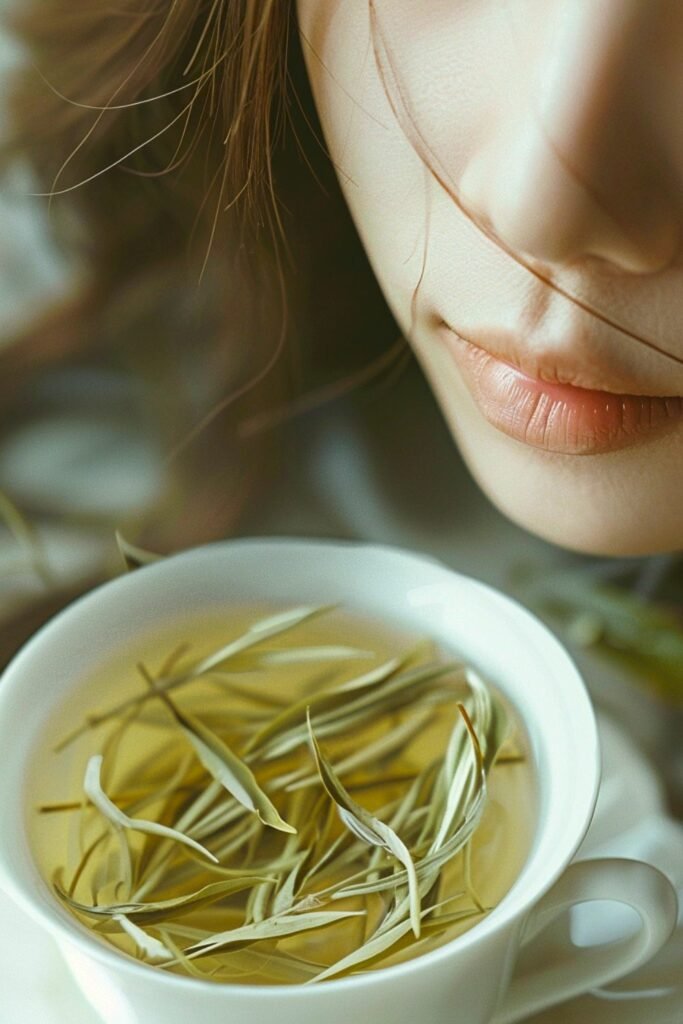
Exploring White Tea’s Anti-Aging Properties
- Rich in Antioxidants: White tea contains high levels of catechins and polyphenols. These antioxidants help combat skin aging by neutralizing free radicals, which are responsible for much of the skin damage and aging signs due to environmental factors.
- Protection Against Skin Oxidative Stress: A study published in Journal of Pharmaceutical Research International highlights that white tea extracts can significantly increase the skin’s resistance to oxidative stress, promoting healthier, younger-looking skin.
- Collagen and Elastin Preservation: White tea helps protect vital skin proteins like collagen and elastin, which are essential for maintaining skin’s elasticity and firmness. Research indicates that regular consumption of white tea can reduce the activity of enzymes that break down collagen and elastin, thereby slowing the aging process and helping prevent wrinkles and sagging.
Tips for Incorporating White Tea into Your Skin Care Routine
- Temperature Control: When brewing white tea for drinking or topical applications, ensure the water is not too hot to maintain the integrity of its delicate antioxidants.
- Integration with Other Antioxidants: Combine your white tea consumption with other antioxidant-rich foods and teas to enhance the overall skin-protecting effect.
- Consistency Is Key: Regular consumption and use of white tea are essential for seeing significant results in skin appearance and health.
Simple White Tea Tonics for Youthful Skin
- Daily White Tea Drink:
- Preparation: Brew 1-2 teaspoons of white tea leaves in hot water (just below boiling) for 4-5 minutes. This ensures optimal extraction of antioxidants without releasing too many tannins, which can make the tea bitter.
- Benefits: Drinking white tea daily can provide internal antioxidant benefits that reflect externally in the form of smooth, supple skin.
- White Tea Facial Mist:
- Ingredients: Brewed white tea (cooled), aloe vera gel, and a few drops of lavender essential oil for added soothing effects.
- Preparation: Mix equal parts of brewed white tea and aloe vera gel, add a few drops of lavender oil, and pour into a spray bottle.
- Application: Use as a facial mist throughout the day to hydrate, refresh, and provide antioxidants directly to the skin.
White tea offers a gentle yet powerful approach to anti-aging, providing a host of benefits from its rich antioxidant content.
Whether consumed as a daily tonic or used topically in beauty treatments, white tea can be a valuable addition to your skincare regimen, helping to maintain youthfulness and vitality in the skin.
3. Chamomile Tea: Soothing and Anti-Inflammatory
Chamomile tea, famous for its calming effects when ingested, also has powerful benefits for skin health. This gentle herb is particularly valued for its anti-inflammatory, healing, and soothing properties, making it an excellent choice for those with sensitive or irritated skin.
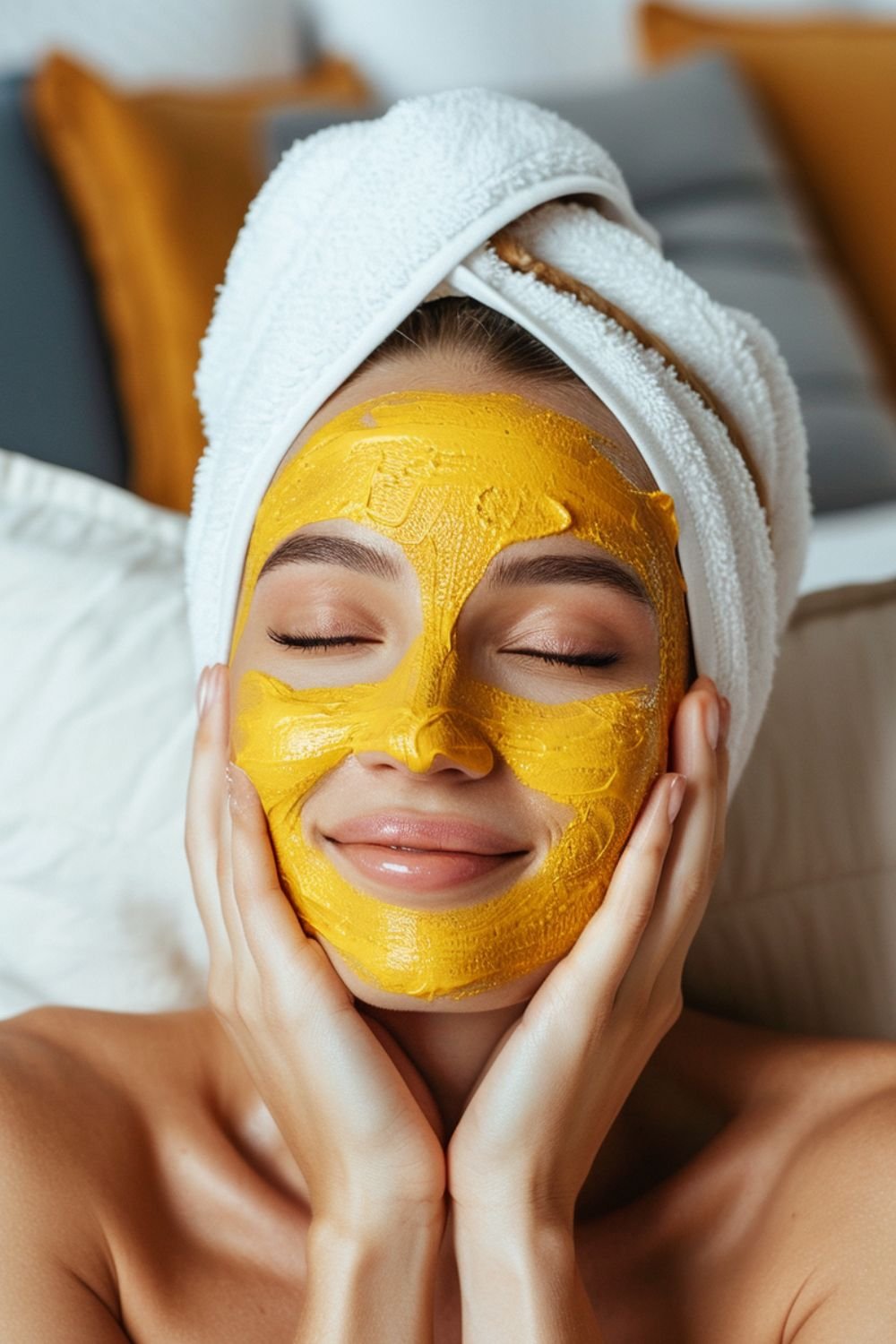
How Chamomile Tea Can Soothe Irritated Skin
- Anti-inflammatory Properties: Chamomile is rich in compounds like bisabolol and chamazulene, which have strong anti-inflammatory and skin-soothing effects. A 2010 study found that these compounds help reduce skin inflammation and speed up the healing process.
- Skin Healing and Regeneration: Chamomile’s ability to promote tissue regeneration is well-documented. Research in Pharmacognosy Review highlights its use in treating wounds and other skin conditions by accelerating cell and tissue renewal.
- Hydration and Softening: Chamomile also has hydrating properties, which help maintain skin’s moisture balance, improving texture and reducing dryness. Its mild nature makes it suitable for daily use without the risk of irritation.
Integrating Chamomile Tea into Your Daily Skin Care Routine
- Drinking for Internal Benefits: Regularly drinking chamomile tea can provide internal anti-inflammatory benefits that reflect in your skin’s health and appearance.
- Topical Applications: Incorporate chamomile into your skincare routine through homemade toners, masks, and washes to directly leverage its soothing and healing properties.
- Evening Rituals: Using chamomile tea in your evening skincare routine can help reduce inflammation and prepare the skin for healing and regeneration overnight.
Recipes for Chamomile Face Masks and Washes
- Chamomile and Honey Face Mask:
- Ingredients: 1 tablespoon of dried chamomile flowers or 2 chamomile tea bags, 2 tablespoons of raw honey, 1 teaspoon of natural yogurt (optional for extra hydration).
- Preparation: Steep chamomile in boiling water for 10 minutes. Strain and mix the tea with honey and yogurt to form a paste.
- Application: Apply to the face, leave on for 15-20 minutes, then rinse with warm water. This mask is ideal for soothing and hydrating irritated or dry skin.
- Chamomile Tea Facial Rinse:
- Ingredients: 2-3 chamomile tea bags or a handful of dried chamomile flowers.
- Preparation: Brew a strong pot of chamomile tea and let it cool.
- Use: Use the cooled tea as a final rinse after your regular cleansing routine to calm the skin and add a glow to your complexion.
The natural soothing qualities of chamomile make it a valuable addition to any skincare regimen, especially for those looking to alleviate irritation and promote skin health without harsh chemicals.
4. Rooibos Tea: The Skin Calmer
Rooibos tea is derived from the leaves of the Aspalathus linearis shrub native to South Africa. It is caffeine-free and packed with health-promoting antioxidants, making it an excellent choice for skin care.
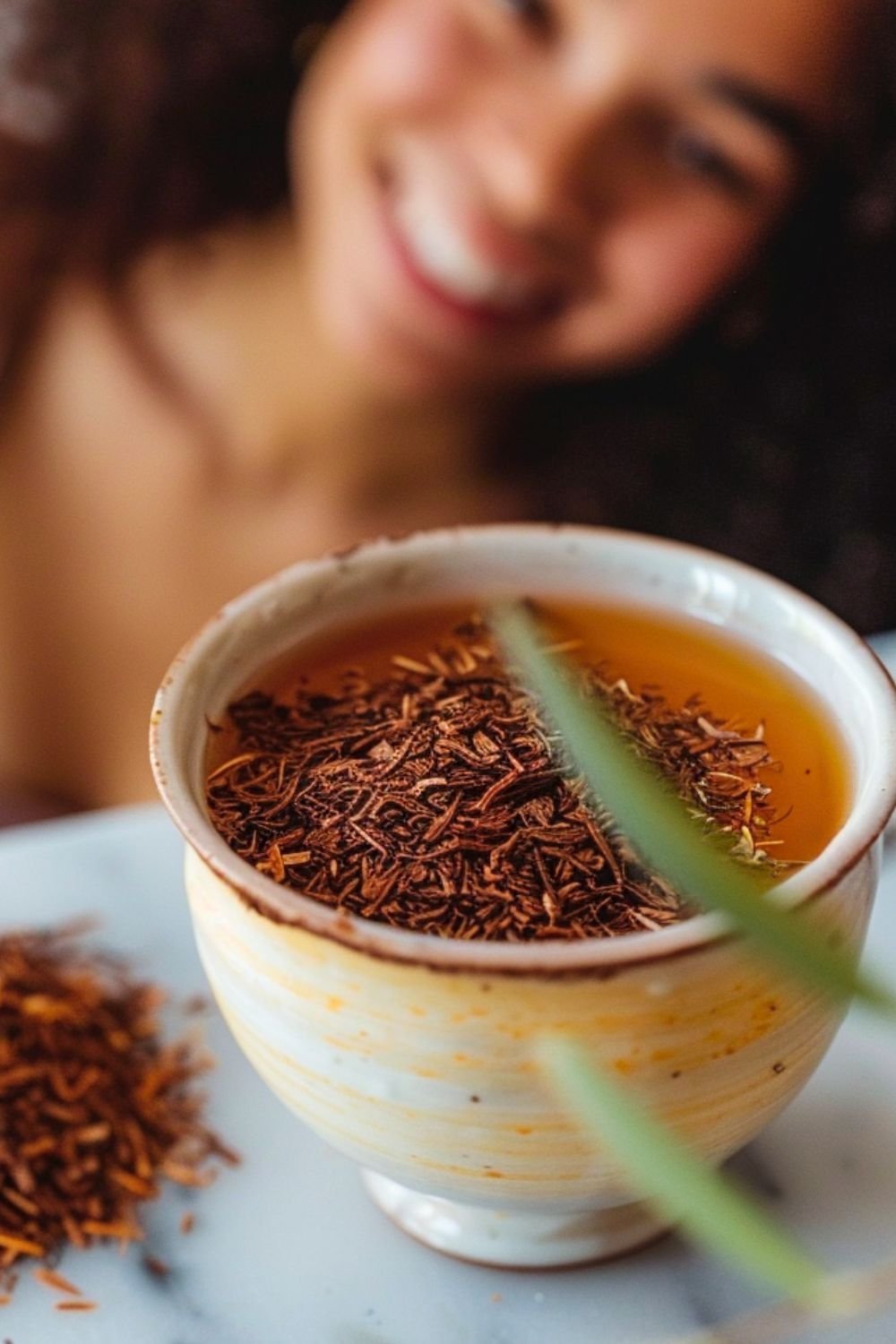
Rooibos is particularly noted for its anti-inflammatory and antioxidant properties that can help address a variety of skin issues.
Benefits of Rooibos for Treating Skin Conditions
- Anti-Inflammatory Properties: Rooibos contains a unique antioxidant called aspalathin, which has shown significant anti-inflammatory effects. New research indicates that aspalathin can reduce inflammation markers in the body, which is beneficial for treating conditions like eczema and acne.
- Antioxidant Effects: Rooibos is rich in antioxidants such as nothofagin and superoxide dismutase. These compounds help fight free radicals, which are responsible for premature aging and skin damage.
- Hypoallergenic Properties: Due to its natural anti-inflammatory properties, rooibos is also great for sensitive skin. It can soothe redness and irritation without causing further aggravation.
Integrating Rooibos Tea into Your Skin Care Routine
- Drinking Rooibos Tea: Regular consumption of rooibos tea can internally provide its anti-inflammatory and antioxidant benefits, contributing to a healthy skin complexion.
- Topical Applications: Applying cooled rooibos tea as a toner or using rooibos-infused products can directly benefit the skin, helping to soothe irritation and provide antioxidant protection.
Making Rooibos Infused Oils for Skin Care
- Rooibos Infused Oil:
- Ingredients: 1 cup of carrier oil (such as coconut or jojoba oil), ¼ cup dried rooibos leaves.
- Preparation: Combine the rooibos leaves and carrier oil in a jar and seal it. Place the jar in a warm, dark place for about 4 weeks, shaking occasionally.
- Use: Strain the leaves from the oil. Use the infused oil directly on the skin or as a base for homemade creams and lotions. This oil is excellent for moisturizing and soothing the skin, reducing irritation and redness.
5. Oolong Tea: Balancing and Moisturizing
Oolong tea, a traditional Chinese tea that is partially fermented, strikes a balance between green and black teas in both flavor and chemical composition. This unique tea is rich in antioxidants and has specific benefits for skin health, particularly in balancing oil production and enhancing hydration.
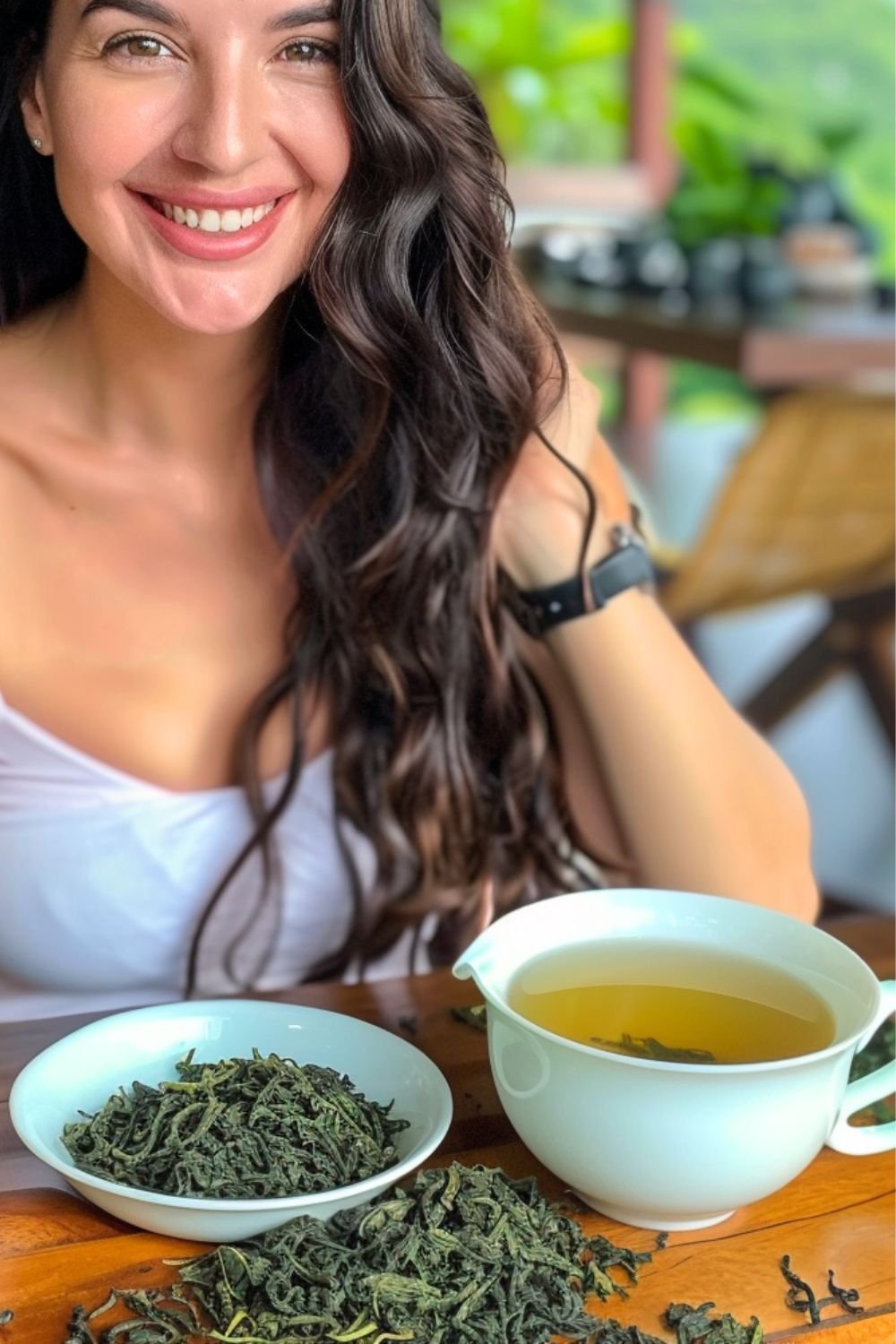
Oolong tea offers a practical and enjoyable approach to managing oily and acne-prone skin while providing significant hydration and antioxidative benefits.
The Unique Benefits of Oolong Tea for Balancing Oily Skin
- Regulation of Sebum Production: Oolong tea contains polyphenols that can help regulate sebum (natural skin oil) production, making it beneficial for those with oily or acne-prone skin.
- Antioxidant and Anti-inflammatory Properties: The antioxidants in oolong tea, such as theaflavins, combat free radicals and reduce inflammation, which can exacerbate skin conditions like acne.
Drinking Oolong Tea for Skin Health
- Daily Consumption: Incorporating oolong tea into your daily diet can help provide systemic antioxidant benefits that reflect in improved skin condition. Aim for 1-2 cups per day to harness its full potential for balancing skin oils and enhancing hydration.
- Nutritional Synergy: Combine your oolong tea consumption with a diet rich in fruits, vegetables, and healthy fats to maximize skin health benefits. The nutrients in these foods complement the effects of oolong tea, supporting skin structure and function.
Steps to Create Oolong Facial Spray
- Oolong Tea Facial Spray:
- Ingredients: 1 tablespoon of loose oolong tea leaves, 1 cup of boiling water.
- Preparation: Steep the oolong tea leaves in boiling water for 5-10 minutes. Strain and let the tea cool completely.
- Use: Pour the cooled tea into a clean spray bottle. Spritz on the face after cleansing or throughout the day for a refreshing, hydrating, and oil-balancing boost.
6. Peppermint Tea: The Acne Fighter
Peppermint tea, derived from the leaves of the Mentha piperita plant, is celebrated for its refreshing flavor and health benefits, especially in skin care. Its potent anti-inflammatory and antimicrobial properties make it an excellent choice for combating acne and soothing irritated skin.
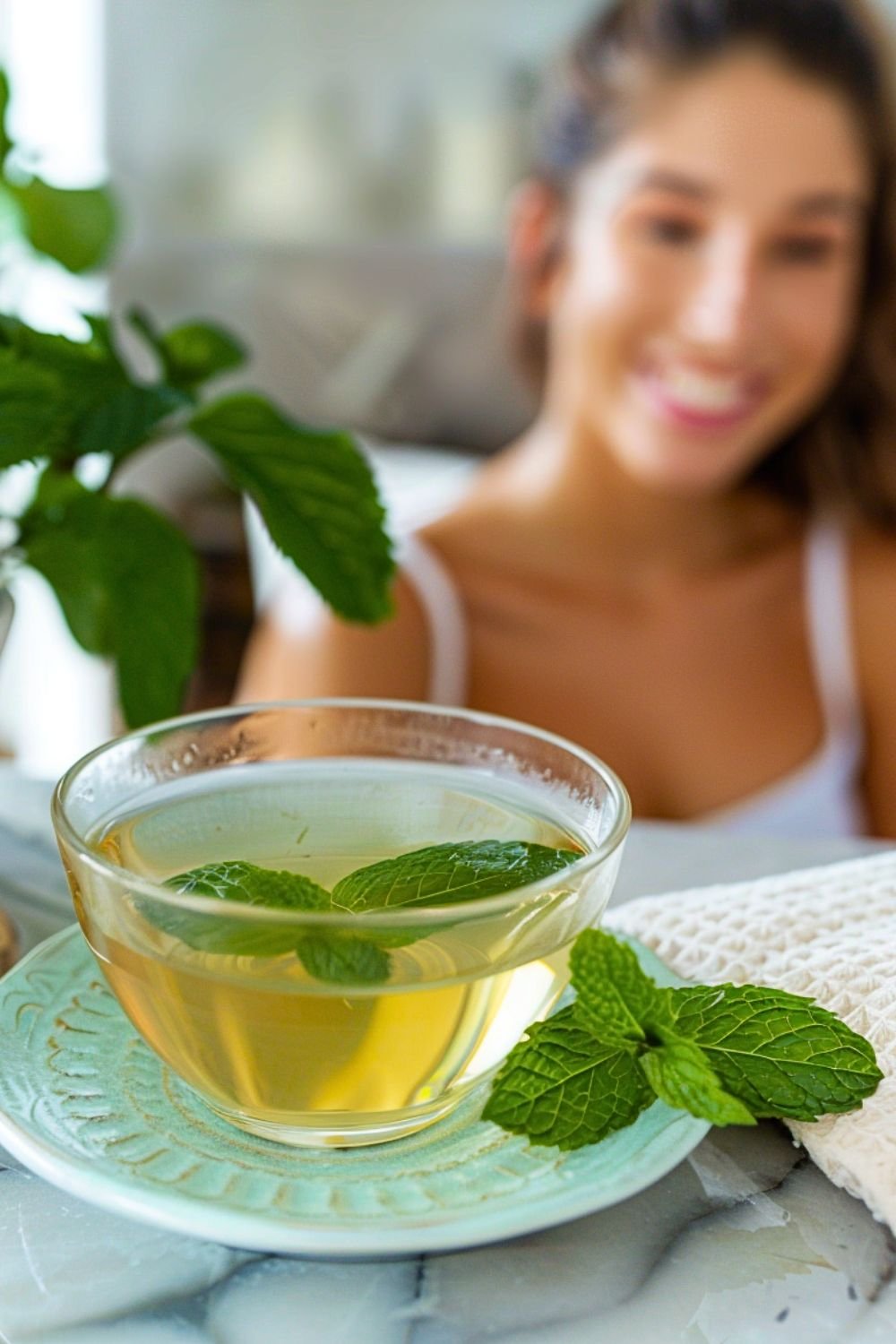
How Peppermint Tea Can Help Reduce Acne Breakouts
- Antimicrobial Properties: Peppermint contains menthol and other volatile compounds that have strong antimicrobial actions, effective against bacteria that can cause acne. A study published in the International Journal of Dermatology indicates that peppermint oil can inhibit the growth of Propionibacterium acnes, the bacteria directly involved in acne development.
- Anti-inflammatory Effects: Peppermint also exhibits significant anti-inflammatory properties, helping to reduce the redness and swelling often associated with acne. Research detailed in the Journal of Clinical Pharmacy and Therapeutics shows that peppermint can alleviate inflammation through several pathways, making it a useful remedy for inflammatory skin conditions.
Drinking Peppermint Tea for Skin Health
- Regular Consumption: Ingesting peppermint tea can provide internal anti-inflammatory benefits that complement its topical use. Drinking one to two cups daily can help manage inflammation from within, promoting healthier skin overall.
- Dietary Considerations: Combine peppermint tea consumption with a balanced diet rich in antioxidants and omega-3 fatty acids to enhance skin health and fortify your body’s natural ability to fight inflammation.
Mixing Peppermint Tea into DIY Acne Treatments
- Peppermint Tea Toner:
- Ingredients: 1 cup of brewed peppermint tea (cooled), ½ teaspoon of witch hazel, a few drops of tea tree oil for added antimicrobial effect.
- Preparation: Combine all ingredients in a clean bottle.
- Use: Apply to the skin using a cotton ball after cleansing, particularly focusing on acne-prone areas. The combination of peppermint, witch hazel, and tea tree oil makes an effective toner that helps cleanse pores and reduce breakouts.
- Peppermint Tea Ice Cubes:
- Preparation: Brew a strong peppermint tea, then pour into an ice cube tray and freeze.
- Use: Rub a peppermint tea ice cube over inflamed areas as a soothing treatment to reduce swelling and redness. The cooling effect of the ice further helps to soothe irritated skin.
7. Jasmine Tea: Revitalizing and Fragrant
Jasmine tea combines the health benefits of green tea with the soothing properties of jasmine. This aromatic tea is not only a delight for the senses but also beneficial for skin health, particularly in enhancing skin tone and elasticity.
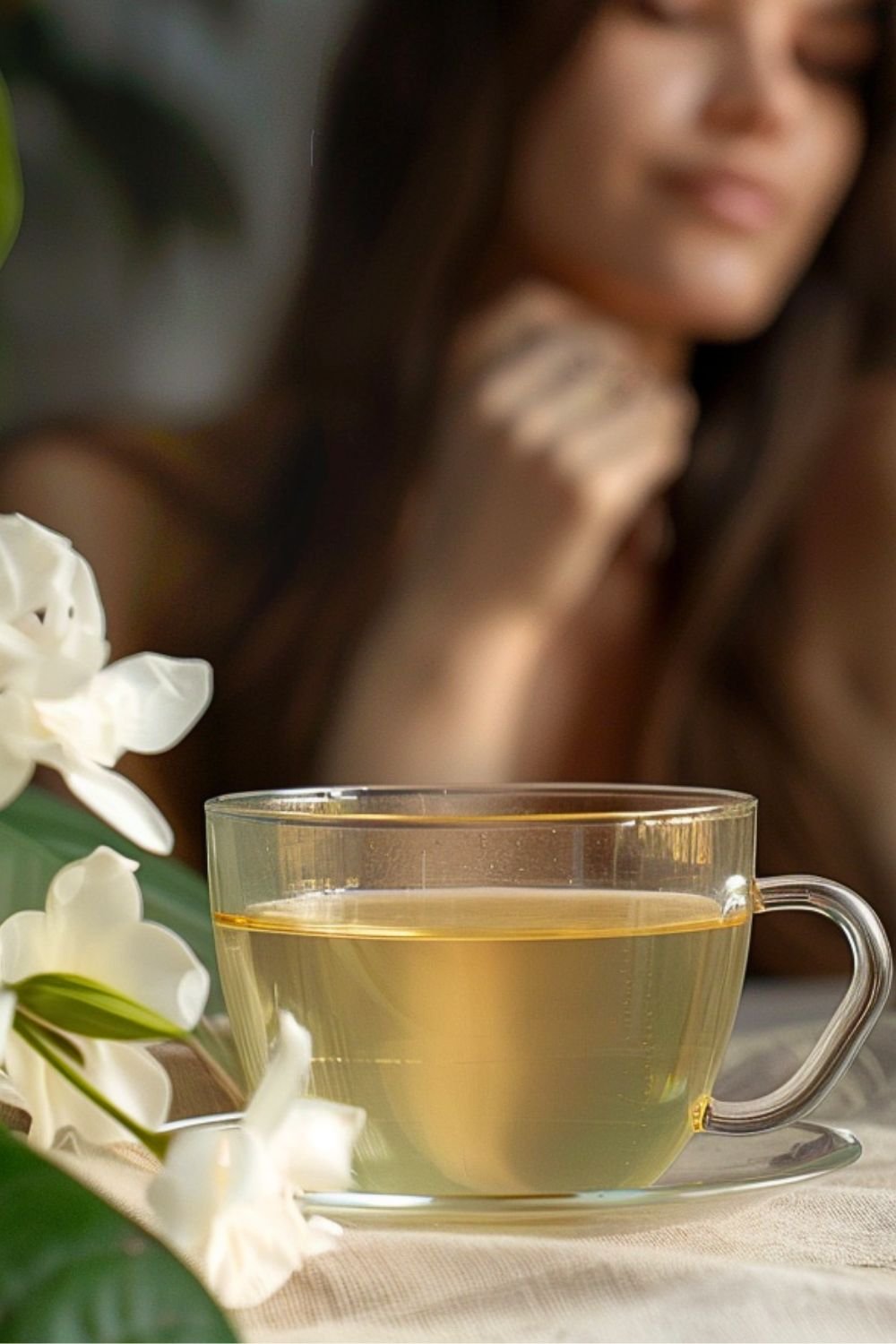
Benefits of Jasmine Tea for Skin Tone and Elasticity
- Antioxidant Properties: Like green tea, jasmine tea is rich in antioxidants that protect the skin against free radical damage. This can help prevent the signs of aging and promote a more even skin tone.
- Stress-Reducing Effects: The aroma of jasmine has been noted to have a calming effect, which can reduce stress levels. Lower stress levels can lead to clearer skin, as stress is a common cause of acne and other skin problems.
Integrating Jasmine Tea into Your Skin Care Routine
- Topical Application: Jasmine tea can be applied topically as a toner or added to bathwater for a soothing and fragrant bath that benefits the skin. Its anti-inflammatory properties can soothe irritated skin, while its pleasant scent provides a relaxing experience.
- Daily Drinking: Regular consumption of jasmine tea can contribute to overall skin health due to its antioxidant properties. Drinking 1-2 cups daily can help improve your skin’s elasticity and appearance from the inside out.
- Combining with Skincare Products: Infuse jasmine tea into DIY skincare products like lotions or serums to harness its benefits in your daily skin care regime. The antioxidants and soothing properties of jasmine make it a valuable ingredient for maintaining youthful and vibrant skin.
Creating Jasmine Tea Steam Facials
- Jasmine Tea Steam Facial:
- Ingredients: 1-2 tablespoons of loose jasmine tea leaves.
- Preparation: Boil a pot of water and add the jasmine tea leaves.
- Use: Pour the hot tea into a bowl, lean over the bowl, and cover your head with a towel to trap the steam. Allow the steam to bathe your face for 5-10 minutes. This method helps open up the pores, facilitating the removal of toxins and aiding in hydration.
Tea Blends for Comprehensive Skin Care
Combining different types of teas can create synergistic blends that harness multiple benefits, enhancing overall skin health.
So let’s see how to mix various teas to address specific skin concerns, providing recipes for custom tea blends and insights into their beneficial properties!
Combining Different Teas for Enhanced Skin Benefits
- Green and White Tea Blend: Mixing green and white teas can amplify their anti-aging properties. Both teas are rich in antioxidants, which protect the skin from environmental stressors and aid in cell regeneration.
- Rooibos and Chamomile Blend: This combination is perfect for sensitive or irritated skin. Rooibos provides anti-inflammatory benefits while chamomile soothes and calms the skin. The blend is ideal for reducing redness and irritation.
Custom Tea Blend Recipes for Specific Skin Concerns
- Antioxidant Powerhouse Blend:
- Ingredients: Equal parts green tea, white tea, and jasmine tea.
- Preparation: Mix the teas together and brew in hot water for about 3-5 minutes.
- Benefits: This blend offers a full spectrum of antioxidants that protect skin from oxidative stress, promote a youthful complexion, and maintain hydration.
- Soothing Skin Blend:
- Ingredients: Equal parts rooibos tea and chamomile tea, with a pinch of licorice root for added soothing effects.
- Preparation: Steep the blend in boiling water for 5-7 minutes.
- Benefits: This tea is excellent for calming inflamed or sensitive skin, helping to reduce redness and provide a soothing effect.
By understanding the individual properties of each tea and how they can complement each other, you can create customized tea blends that cater specifically to your skin’s needs.
Feel free to combine and experiment with the different teas included in this guide!
Tips for Adding Tea to Your Skin Care Routine
Incorporating tea into your skincare regimen involves more than just drinking it. Applying tea topically and integrating it into various beauty routines can maximize its benefits for skin health.
Next, I’ll provide some practical advice on safely and effectively using tea internally and externally for optimal skin benefits.
Safely Testing Skin Reactions to Topical Tea Applications
- Patch Testing: Before using tea-based products on your face or body, especially if you have sensitive skin, perform a patch test. Apply a small amount of the tea or tea-infused product to the inside of your wrist or elbow and wait 24 hours to observe any adverse reactions.
- Dilution: When using tea topically for the first time, consider diluting it with water or a carrier oil (for oil infusions) to minimize any potential irritation.
Integrating Tea into Topical Skin Care Treatments
- Tea Compresses and Soaks: For soothing irritated or sunburned skin, soak a cloth in cooled tea (such as chamomile or green tea) and apply it as a compress to the affected areas. This method provides a direct, soothing, and anti-inflammatory effect.
- DIY Tea-Based Skin Care Products: Create your own tea-infused beauty products, such as toners, masks, and cleansers (as instructed earlier in this guide).
Regularity and Consistency in Use
- Routine Integration: Consistently include tea in your daily routine to see significant improvements in skin health over time. Whether as a morning beverage or part of your nightly beauty regime, regular use increases the efficacy of its beneficial properties.
- Evaluating Effects: Keep a journal or take photos to track the condition of your skin over time. This can help you determine how effectively tea is working for your skin and whether adjustments are needed in the type or frequency of use.
By following these tips, you can safely incorporate tea into your skincare routine and maximize its many benefits.

